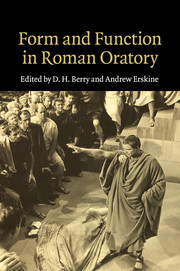Form and Function in Roman Oratory
Langue : Anglais
Coordonnateurs : Berry D. H., Erskine Andrew

This book explores the interplay of form and function in both real and fictional oratory at Rome.
In this book Roman oratory is explored from the perspective of form and function. Leading scholars in the field of Latin prose consider not only the speeches of Cicero, Pliny, Apuleius and the later panegyrists, but also those found in Roman philosophical writing, and in the histories of Caesar, Sallust, Livy and Tacitus. In each case, analysis of the interplay of form and function takes us to the heart of the process by which the author's aims are realised. The book also considers the functions of texts within speeches, the functions of not speaking and the representation of oratorical 'form' in Roman sculpture. An original and wide-ranging study, Form and Function in Roman Oratory will appeal to scholars and students with interests in Roman oratory, historiography, philosophy and art.
Contributors; Preface; List of figures; 1. Form and function D. H. Berry and Andrew Erskine; Part I. The Orator and his Setting: 2. Court procedure and rhetorical strategy in Cicero J. G. F. Powell; 3. Tribunician sacrosanctity and oratorical performance in the late republic Catherine Steel; 4. Togate statues and petrified orators Glenys Davies; Part II. Rhetorical Strategies: 5. Means and ends of Indignatio in Cicero's Pro Roscio Amerino Christopher Craig; 6. Form as global strategy in Cicero's Second Catilinarian Andrew M. Riggsby; 7. The form and function of narrative in panegyric Roger Rees; 8. Unending praise: Pliny and ending panegyric Bruce Gibson; Part III. Texts in Speeches: 9. The function of a divinely inspired text in Cicero's De harvspicvm responsis Anthony Corbeill; 10. Debate at a distance: a unique rhetorical strategy in Cicero's Thirteenth Philippic John T. Ramsey; 11. The function of verse quotations in Apuleius' speeches: making the case with Plato Regine May; Part IV. Speeches in Philosophy: 12. Teaching philosophy, a form or function of Roman oratory: Velleius' speech in Cicero's De Natvra Deorvm Carl Joachim Classen; 13. Form and function of speech in the prose work of the younger Seneca Harry Hine; Part V. Speeches in Historiography: 14. Catiline's speeches in Sallust's Bellvm Catilinae William W. Batstone; 15. Speech and silence in Caesar's Bellvm Gallicvm Christina Shuttleworth Kraus; 16. Rhetorical history: the struggle of the orders in Livy Christopher Smith; 17. Oratory in Tacitus' Annals Roland Mayer; 18. Aliena Facvndia: Seneca in Tacitus A. J. Woodman; Notes; Abbreviations and bibliography; Indexes.
D. H. Berry is Senior Lecturer in Classics at the University of Edinburgh. He is the author of Cicero: Pro P. Sulla Oratio (1996), Cicero: Defence Speeches (2000) and Cicero: Political Speeches (2006). He has also edited a revision of M. L. Clarke's Rhetoric at Rome (1996).
Andrew Erskine is Professor of Ancient History at the University of Edinburgh. He is the author of The Hellenistic Stoa: Political Thought and Action (1990) and Troy between Greece and Rome: Local Tradition and Imperial Power (2001). He is also the editor of A Companion to the Hellenistic World (2003) and A Companion to Ancient History (2009).
Andrew Erskine is Professor of Ancient History at the University of Edinburgh. He is the author of The Hellenistic Stoa: Political Thought and Action (1990) and Troy between Greece and Rome: Local Tradition and Imperial Power (2001). He is also the editor of A Companion to the Hellenistic World (2003) and A Companion to Ancient History (2009).
Date de parution : 09-2016
Ouvrage de 368 p.
15.3x23 cm
Disponible chez l'éditeur (délai d'approvisionnement : 14 jours).
Prix indicatif 32,87 €
Ajouter au panierDate de parution : 07-2010
Ouvrage de 368 p.
16x23.5 cm
Disponible chez l'éditeur (délai d'approvisionnement : 14 jours).
Prix indicatif 107,93 €
Ajouter au panier
© 2024 LAVOISIER S.A.S.



